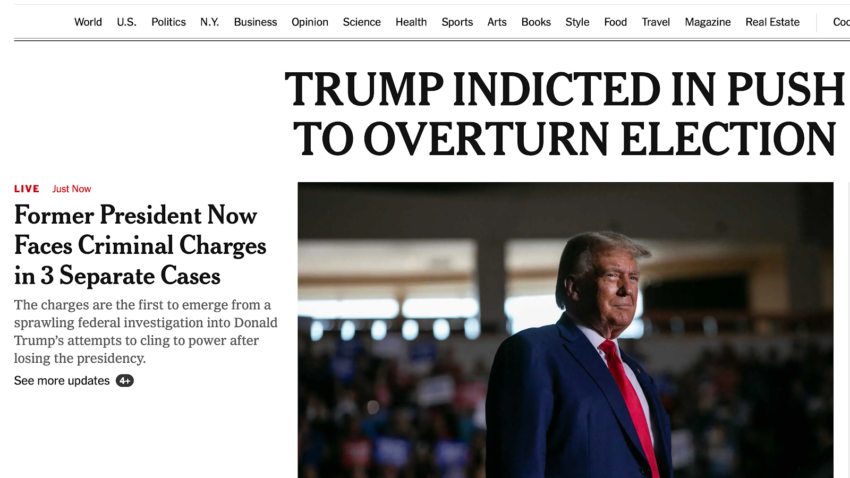Brooks’ column is entitled, “What If We’re the Bad Guys Here?” To refresh your memory, Brooks is the resident guy on the right at the Times, but as tradition dictates he’s really a very strange kind of mushy-middle straddler. He also was famous as the guy who fell in love with the perfect crease in Obama’s pants and, as far as I know, has never fallen out of that love.
You may say “why read Brooks?”, and it’s a good question. My answer is that people like Brooks fascinate me. Intelligent but not wise, he often half gets it and half doesn’t, and seems to be attracted to the surface of things rather than their depth. In that, I think he’s not so very unusual, and as such it’s of interest to look at what he’s saying and the way he thinks.
His column contains a rather good description of how today’s “elites” – among whom he places himself, so there’s some insight there – have isolated themselves from many other Americans and incurred their wrath. But he seems to think that the worst thing about that is that it’s led to the rise of Donald Trump.
A sample of the column:
Trump’s poll numbers are stronger against Biden now than at any time in 2020.
What’s going on here? Why is this guy still politically viable, after all he’s done? …
… [We anti-Trumpers tell a story in which] we anti-Trumpers are the good guys, the forces of progress and enlightenment. The Trumpers are reactionary bigots and authoritarians. Many Republicans support Trump no matter what, according to this story, because at the end of the day he’s still the bigot in chief, the embodiment of their resentments, and that’s what matters to them most.
I partly agree with this story; but it’s also a monument to elite self-satisfaction.
So let me try another story on you. I ask you to try on a vantage point in which we anti-Trumpers are not the eternal good guys. In fact, we’re the bad guys.
Brooks then goes on to a fairly comprehensive description of the isolation, selfishness, and – yes, I’ll use the word – privilege that so-called elites have set up for themselves and perpetuated. Here’s just one small part of what he writes about that:
The ideal that “we’re all in this together” was replaced with the reality that the educated class lives in a world up here, and everybody else is forced into a world down there. Members of our class are always publicly speaking out for the marginalized, but somehow we always end up building systems that serve ourselves.
The most important of those systems is the modern meritocracy. We built an entire social order that sorts and excludes people on the basis of the quality that we possess most: academic achievement. Highly educated parents go to elite schools, marry each other, work at high-paying professional jobs and pour enormous resources into our children, who get into the same elite schools, marry each other and pass their exclusive class privileges down from generation to generation.
As I said, it’s rather long and covers a lot of ground. But there’s something curious about it, which is that he doesn’t seem to acknowledge that Trump is supported not just as a reaction by the underclass to elitism. There are plenty of educated people, and/or wealthy people, who support Trump as well, people who have a lot of achievements and a high IQ. Brooks doesn’t attempt to explain them; instead, he offers a reductionist “story” about Trump supporters as fleeing away from elites and towards Trump in reaction to those elites. That explanation seems to me to be true. But there’s a great deal more going on, and it has to do not just with elite privilege and exclusiveness and reaction against it, but with love of America, appreciation of history and the wisdom of the Constitution, and a host of other positive elements and policies that Trump offers.
But Brooks can’t afford to admit that, because he hates Trump.
Here’s where Brooks reveals his Trump-Derangement and self-serving blinders. These are the last two paragraphs of his piece [my emphasis]:
Are Trump supporters right that the indictments are just a political witch hunt? Of course not. As a card-carrying member of my class, I still basically trust the legal system and the neutral arbiters of justice. Trump is a monster in the way we’ve all been saying for years and deserves to go to prison.
But there’s a larger context here. As the sociologist E. Digby Baltzell wrote decades ago, “History is a graveyard of classes which have preferred caste privileges to leadership.” That is the destiny our class is now flirting with. We can condemn the Trumpian populists all day until the cows come home, but the real question is when will we stop behaving in ways that make Trumpism inevitable.
In answer to Brooks’ question in that last sentence: never, if Brooks’ column is any example. Because that next-to-last paragraph is a triumph of elitist stupidity, arrogance, and simple-minded justification. Brooks states that of course the charges against Trump are not just a political witch hunt – but Brooks feels no need to explain why that might be the case, but merely seems to claim it’s a self-evident truth that it is not politically motivated. The stretching of the legal elements of a crime to the breaking point, in order to charge Trump? No problem for Brooks. The fact that Trump, Biden’s main political rival, is indicted by the DOJ under Garland, in the venue and with a judge most likely to convict? No problem for Brooks. The unprecedented nature of such a charge? Brooks is fine with it. The fact that Hunter Biden was given a sweetheart deal by the same DOJ? Just peachy keen with Brooks, and no evidence of political bias.
And then the bizarre statement that Trump is a monster. What does that even mean? What is a “monster” in the political sense? Just as Obama’s pants crease proved to Brooks that he was erudite and sophisticated both as man and thinker, and would make a great president, so something about Trump (his hair? his bragging?) makes him a monster. And not just a monster, but a monster “in the way we’ve all been saying for years? Who is this “we,” keemosabe? And what have you been saying that describes him as a monster? That he watched prostitutes pee on a bed? What preposterous and untrue things do you still believe? Or is your revulsion mostly esthetic?
And Brooks says that Trump is a monster who deserves to go to prison. Is that because he’s guilty of a crime? If so, what crime, and on what are you basing your idea of his guilt? Are you even thinking of trying to counter substantive arguments that he is not guilty? Or is his guilt merely assumed? And if it’s assumed, is it really because you basically trust the legal system and neutral arbiters of justice? I suspect that, if you do, it’s because in recent years you usually like the results.
It also seems to me as though, at the end there, Brooks got tired. He knew he had to put in some sort of “bad Trump” disclaimer, but he was too weary to do it effectively and just put in a sort of telegraphese for other “elites” who agree with him on Trump’s obvious guilt and obvious monstrosity. No need to argue it or prove it. It’s virtue-signaling par excellence.


